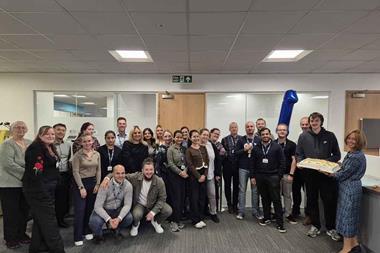tynanbarton · Employee Benefits/GXO podcastListen: As a global logistics firm that is rapidly growing, GXO recognises the importance of offering the right support to people at the right time. As befitting the dire economic times we all face, GXO has implemented a financial wellbeing programme to help its members of staff manage the impact of the cost-of-living crisis.
In this episode of the Employee Benefits podcast, Mark Simmons, HR director for UK and Ireland, explains how supporting the wellbeing of all of its employees, is at the heart of GXO's benefits provision.
GXO is a global contract logistics provider that manages outsourced supply chains and warehousing. It partners with blue-chip firms to solve logistics challenges with supply chain and ecommerce solutions. Its corporate headquarters is in Greenwich, Connecticut, USA.
GXO has a variety of job roles ranging from operational roles in warehousing and transport to automation and technical roles, and in many professional functions including finance, HR, operations, continuous improvements, IT, sales, solutions design.
GXO has 42,000 employees in the UK and Ireland. The average age is approximately 45, and the average length of service is approximately 5.25 years.
Primary business objectives that impact benefits for the coming year
- Helping with cost of living through financial wellbeing campaign
- Wellbeing support
- Business growth

Career history
Mark Simmons is the HR and quality, health, safety and environment (QHSE) director, UK and Ireland at GXO Logistics. His responsibilities include the setting, development and execution of the HR and people strategy for the UK and Ireland operations.
Simmons began his career at Proctor and Gamble, and moved into HR at both Revlon and Body Shop International. He joined GXO in 2005 as HR business partner in the transport division, and was promoted to HR director in 2006.
Simmons says: "I am proud of many things we have achieved in the business over many years, however, two things stand out: firstly the people-centric culture we have developed and sustained in the UK and Ireland business, and secondly delivering the growth we have achieved from a talent and people perspective.
"When I joined we had just over 5,000 colleagues in the business and today this is over 42,000 with the recent acquisition of the Clipper business."
Read more:
Listen to the previous podcast:
Funding Circle creates tailorable benefits package to suit each employee
















![[FisherA]_portrait_web_crop_newstyle](https://d1m12snq5oxhll.cloudfront.net/Pictures/100x67/9/2/6/108926_fishera_portrait_web_crop_newstyle_714878.jpg)







